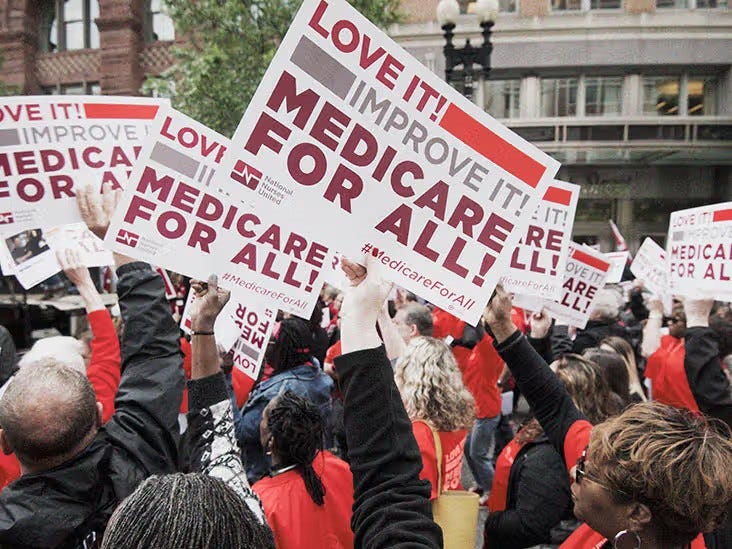With Premiums Set to Rise, a Reminder: Medicare for All Would Save $650 Billion Annually
The liberal voices were out in concert.
“Next year, Americans will see the biggest jump in health insurance costs in 15 years,” said former US Labor Secretary Robert Reich. “Meanwhile, the six largest health insurers raked in more than $31 billion in net income last year. Still not sure if we need Medicare for All?”
Bernie Sanders' staff chimed in. Warren Gunnels, cited studies by the Congressional Budget Office and Yale University, to argue that Medicare for All would be a net money saver. “Medicare for All would save $650 billion and 68,000 lives each and every year while providing comprehensive healthcare to every man, woman, and child with no premiums, no deductibles, and no co-payments,” he wrote. That’s 1300 lives saved a week, 185 a day.
Not to be left out of the conversation, Melanie D’Arrigo, executive director of Campaign for New York Health, argued that the best part of Medicare for All is that it would simply make the private insurance industry obsolete. "Health insurance is not healthcare,” she said. “It’s an unnecessary middleman designed to restrict access to healthcare and exploit people for profit. The fiscal and moral path forward is universal healthcare with Medicare for All.”
The logical response to such accusations is, "Why then, don't we have it?"
Looking for as unbiased an answer as I could find, I asked ChatGPT. Its answer is, apparently, sixfold:
1. Political power and lobbying
The health insurance and pharmaceutical industries spend more on lobbying Washington than almost any other sector—consistently over $600 million per year.
These industries employ armies of lobbyists and finance political campaigns, shaping both parties’ positions.
Lawmakers who float Medicare for All often face coordinated pushbacks, not just from insurers, but also from hospitals and large employer groups.
2. Fear of disruption
Roughly half a million Americans work in private insurance, and many more in billing, claims, and HR roles tied to our fragmented system. Opponents warn of “job losses” if a single-payer system replaced the current maze.
Employers also fear losing the ability to offer health benefits as a recruiting tool.
3. Taxation optics
Even if Medicare for All saves money overall, it changes who pays. Private premiums and out-of-pocket costs would drop, but taxes (especially federal) would rise.
Politically, “higher taxes” is an easier attack line than “lower overall costs.”
4. Public opinion is split and malleable
When Americans are asked, “Do you want Medicare for All?” about 60% say yes.
But when asked, “Do you want to lose your private insurance?” or “Do you want higher taxes?” support drops. Wording shapes perception.
5. Incrementalism vs. overhaul
The U.S. typically reforms in small steps (Affordable Care Act, Medicaid expansion, Medicare Part D). A full overhaul of a $4.5 trillion industry feels politically impossible.
Even strong advocates often propose transitional steps—like a public option or lowering Medicare eligibility age—rather than an immediate leap.
6. Ideological resistance
Some Americans and many politicians equate “government-run health care” with loss of freedom, rationing, or inefficiency.
Even though Medicare itself is popular, extending it to all gets caught in ideological battles about the role of government.
Bottom line:
It isn’t about whether Medicare for All would save money—most serious studies suggest it would. It’s about who wins, who loses and who has the political clout. Right now, the stakeholders that would “lose” (insurance companies, pharma, for-profit hospitals) are more powerful than the diffuse majority who would benefit.That’s about as low as a bottom line can get.
If there's any doubt left in your mind about who wins (the wealthy), who loses (the poor and middle class) and who has the political clout, I guess the answer to that last is self evident.
So, how much bang are we getting for our buck?
The World Health Organization has carried out its first ever analysis of the world's health systems. The U.S. health system spends a higher portion of its gross domestic product than any other country, yet ranks 37th out of WHO's 191 member countries according to its performance, the report finds. Several small countries – San Marino, Andorra, Malta and Singapore are rated close behind second- placed Italy. Pizza, spaghetti carbonara and great healthcare? Mama mia!
37th and next year, Americans will see the biggest jump in health insurance costs in 15 years.
Yet. we claim to be the largest and most free democratic republic in the world.
There is some concern that Ben Franklin's comment that the Continental Congress had given us "a republic, madam, if you can keep it," may be leaking around the edges.

